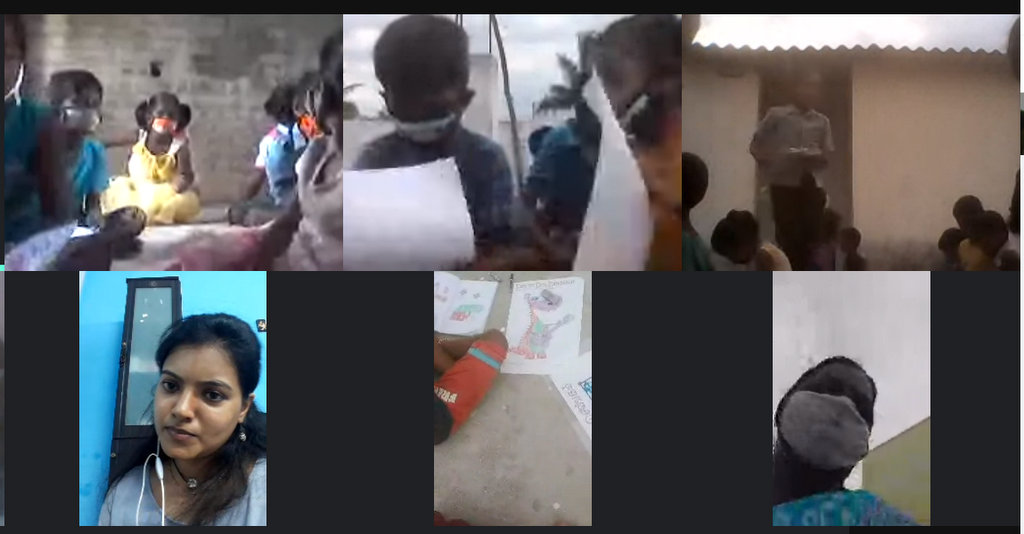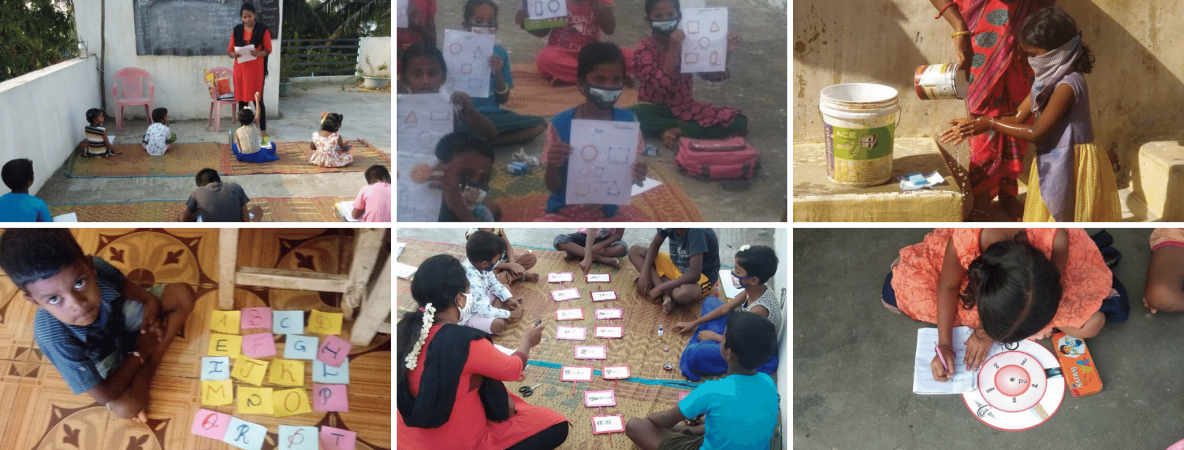All the schools that Asha Chennai supports were closed down by middle of March. They are yet to open and there is no clear idea of when they may even open. Even in a normal school year, children forget about 30% of what they learn the previous academic year during the summer holidays. This year was anything but normal. The schools closed abruptly not giving the teachers any time to tie the topics into a proper conceptual framework. Further the break in schooling is a lot longer than the typical summer holidays. The break is already 4 months long with no end in sight.
While this is a problem for all children in India, this particularly affect the poor and increases the already vast disparity that exists between the poor and the elite. Educated parents will find ways to continue engaging their children in ways that stimulate the child’s mind. Further the elite schools find ways to engage the students through online classes, Whatsapp assignments, LMSes like Google Classroom and a wide variety of online contents. These are non-starters in government schools as most of the children do not have access to a smartphone or computer. Here is an excellent article in the Economist about this problem worldwide.
On the other side, the teachers were also unable to effectively use their time. Asha Chennai was engaging the teachers to some extent to enhance the content offering in our Asha Kanini package. However they were not able do their primary work of teaching children. Covid-19 has placed severe limitations on human interactions. With these constraints, mini-schools were the best we felt we can do.
What are these Mini-schools?
Many of our teachers come from the villages that we serve or other villages that are similar in profile. These villages were fairly unaffected by the Corona virus pandemic and they were quite open internally while not allowing free movement to people from the outside. The children in these villages were anyway playing with other children in the village and moving about within the village. We felt we could start small local schools in villages where our teachers live. The children will come to the school for a little while and the teacher will give them some activities to do during the class or at home till the next class. This will enable the teacher to handle multiple batches one on each day and thus keep the class size small.
There were several challenges. As the government had clearly ordered that the schools should be closed, the head-mistresses of the various schools were afraid to allow the school to be used for this. And clearly these mini-schools cannot function without the full support from the local community. They need to send the children, allow the teacher to get together with the children which however many precautions we take, brings an element of risk of transmitting the dreaded virus, etc. Also, in many cases the teachers’ houses were not big enough to bring the children and conduct the class, and the classes had to be conducted in some public space nearby like a temple or a partially constructed panchayat building. Here are a couple of photos of schools being held in public places.
To give you an idea of the challenges, one of the villages where we have worked for a number of years is Ammambakkam, a village in Poondi block of Thiruvallur. Two of our teachers live in Ammambakkam. However they both live outside the main village area. Ammambakkam is also located close to a centre of sorts, Seethanjeri. During the Koyambedu outbreak, couple of people in Seethanjeri were also infected. This made the villagers at Ammambakkam scared to have the two teachers coming in from the outside (even though it was still within the same Panchayat) or take the children outside to their home. Therefore, we had to abandon the hope of starting a mini-school there.
Curriculum
Once we identified a number of villages where the community welcomed our initiative, we needed to develop a minimal curriculum that these schools will follow. We decided to focus on language (Tamil and English) and Mathematics. Having conducted assessments at all our schools, we had an understanding of the gaps in the learning of the children. For eg. In English the focus was going to be on understanding stories. The teachers will tell at least one story every week to the children and if possible get the children to read it. In Mathematics the focus was going to be to develop a proper understanding of the basic operations and not in the mastery of techniques. We developed a whole series of activites and worksheets around these themes. This was also interspersed with things like games and craft activites that will be interesting to the children. We printed and distributed copies of these worksheets and distributed these along with a set of TLM materials (charts, sketch pens etc.) to the teachers. The curriculum is an ongoing exercise. The teachers are seeing what works and what doesn’t and are evolving what they teach to suit the circumstances.
Here are some photos of children learning by doing various things.
Ground Rules for Safety
While the children’s education is important, safety is paramount in the present circumstances. We decided to follow the following ground-rules.
- Only 10 children per batch at any time. Even for that number of students, the space available should permit reasonable distance between the children.
- Children should wash their hands with soap and also their feet before coming in.
- The space should be open to air and not congested.
- We will provide a mask to each child but also ask the parent to provide some more so that the children have a reasonable number of these. The children should be made to wear them to the extent possible and the teacher should wear them as well.
Here are some photos of the hygiene practices at our mini-schools.
Over and above these rules we allowed the teachers the freedom to determine whether it is safe to run the mini-school. They are the ones in touch with their community and depending on the perception of threat of the disease spread in their area, they will take a call whether to continue the school or not. The teachers would be given alternate work on content development if they are not able to continue with the mini-school and thus their salary was not dependent on their continuing these mini-schools.
Mini-Schools
Teachers in our rural projects enthusiastically came forward to start schools in their own villages. Initially there was some concern about whether their village and the parents will be open to the idea and about how these will function. But when they saw (in a Whatsapp group), how some of the other early mini-schools were running, they also jumped in.
Our project in the vicinity of Chennai could not start these mini-schools because of the extent of spread of Covid-19 here. But all our other rural projects have started mini-schools. A total of 18 mini-schools were started – 13 in project Sangamam (Thiruvallur Dist), 4 in Project Pearl (Thoothukudi Dist) and one in Project Thulasi (Villupuram Dist). In all the three projects, we started mini-schools in the village of our coordinators/stewards where we had maximum presence. Our Sangamam project office, our Nagalpuram library and our Seeyapoondi tuition centre became our first mini-schools. Namadhimangalam where two of our teachers come from including our Maths lead teacher who designed the Maths curriculum for the mini-schools was also an early school.
Several teachers approached us to ask if they can run a mini school in their village even if the school in their village is not being supported by Asha. We allowed them to start mini-schools in such villages as well. We run such mini-schools in Panapakkam in Thiruvallur Dist and at Pudhupatti and Salai Pudhur in Thoothukudi Dist.
We had a meeting on June 1st with all the potential mini-school teachers and discussed the ground-rules with them. Then the first mini-schools started operating on the 3rd. By the end of that week about 15 mini-schools were already operational. Three of the mini-schools closed down when Corona cases were identified in those areas. These are Pondhavakkam, Neyveli and Valasai Vettikaadu. One additional mini-school at Annanagar was also started recently. As of 9th July, 15 of these schools are running successfully.
The mini-schools run for two hours either in the morning or in the evening depending on the convenience of the teacher and the village. Many of our mini-schools also conducted an activity for the children on making their own masks with waste cloth. The children enjoyed this activity so much that they were also making masks for the rest of their family.
On 15th June we had two video conference sessions. The volunteers and other supporters of Asha joined the conference along with all the mini-schools. They got an opportunity to see how these mini-schools are being conducted and also interact with the teachers and the children. On June 22nd our Maths trainer Mrs. Meena Suresh also interacted with the mini-schools over another video conference. We will hold these once in a while to give ourselves an opportunity to see these schools.

Click here to see more photos from these Mini-Schools.


Comments 4
मैं बिहार राज्य से पश्चिम चंपारण जिला से हूं मैं भी एनजीओ चलाता हूं अगर आपके तरफ से जो सहयोग हो या आपके पास कोई फंड हो तो मैं देने की कृपया प्रदान करें मैं अभी स्वास्थ्य विभाग की से संबंधित सभी लोगों को जागरूक करता हूं
I am a government school teacher from Chittoor in Andhra Pradesh. Having seen your website interested to know is there any opportunity of anticipating your support aswell your guidance in improving my school children’s academics
specifically communicative skills. Anticipating a reply and opportunity to have a discussion in this regard With Regards
Hi smitha here, I would like to be part and help the children and school as a volunteer in chennai
Thank you
Thanks for your interest, Smitha! Please reach out to chennai@ashanet.org for volunteering opportunities with the chapter.